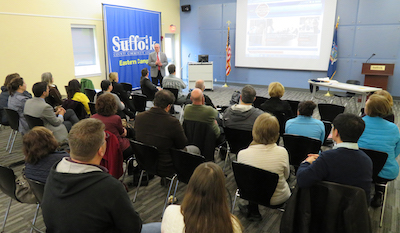Cynthia Eaton
He explicitly acknowledged the “great diversity of sentiment” in our nation. He freely noted that “the fiery trial through which we pass will light us down in honor or dishonor to the latest generation.” He asserted with passion that “The dogmas of the quiet past are inadequate to the stormy present. The occasion is piled high with difficulty, and we must rise with the occasion. As our case is new, so we must think anew and act anew. We must disenthrall ourselves, and then we shall save our country.” He was speaking, of course, about the abolition of slavery. Abraham Lincoln’s second state of the union address on December 1, 1862, offers to his war-weary fellow citizens a proposal for the emancipation of slaves by connecting their freedom with the very future of our nation. This address isn’t typically included among his greatest speeches; it gets too bogged down with unwieldy details about government initiatives and expenditures. But in teaching my students techniques of effective persuasion in my writing classes, the ending of Lincoln’s second state of the union offers a solid example of how a real leader uses language—especially in the face of a deeply divided population—to persuade through inspiration. And I think it’s high time we in the FA use our language—loudly and clearly—to inspire our membership to stand up and speak out now for the very future of our union. Three state of the union meetings The FA officers decided to host three state of the union meetings this semester in hopes of increasing member awareness and activism on several topics, including the following:
All members were invited to attend one of the meetings at the campus nearest them: the Grant Campus on February 28, Ammerman on March 21 or Eastern on April 4. Members speak out “I believe there’s a concern for everyone,” says Joan Cook (Library). “If you don’t like your tax dollars to be wasted, since a Constitutional Convention will cost millions of dollars, just vote NO! It could also jeopardize workers’ rights to join a union, endanger pension benefits—past, present and future—and even undermine the right to free public education, so just vote NO!” Cook continues, “If for some reason you’re not concerned about wasted money, unions, pensions or public education, then you might be concerned about our beautiful natural spaces. A Constitutional Convention could open up opportunities for developers to exploit the beautiful protected places such as the Adirondacks and Catskill Mountains in our great state. Just vote NO!” Deb Provenzano, who like Cook works in the Ammerman library, chimes in, “My concern right away is that this item on the ballot will be sandwiched in between several other items that people would want to vote yes on.” It’s a real problem, she said, because “people may just go down the list and vote yes to all items, including the Con Con,” inadvertently harming themselves. Tim McHeffey (Accounting) expresses concern about threats to union existence, which FA President Kevin Peterman addressed during the meetings. “I don’t think people realize,” he began, “that we dodged a bullet with the Friedrichs case. That was all about taking away unions’ ability to collect dues, but if we all become agency-fee payers, the FA won’t be able to do all that it does—and does so well—for us right now.” “I really count on the FA to keep me up to date regarding politics, union issues and most especially changes or details that will have an impact on me personally,” offers Molly Altizer (English). She admits, “It has been a learning curve for me, as I came here from a ‘right to work’ state (read: no unions allowed),” then adds, “But, thankfully, the FA has been superb at keeping me informed of the urgent issues the union faces on our behalf. It’s urgent that we talk to others, distribute literature, make phone calls and get the word out that the fight to save unions is real.” Joan Cook agrees: “Too many people take union benefits for granted, the benefits that we enjoy—safe working conditions, legal and dental perks and even a place in which to safely air our grievances. These things do not just appear, they are hard earned and fought to keep.” Some of the benefits, notes Justin Turner (History), are precisely what brought him and his wife Brooke to New York from the non-union state of Virginia in the first place. "Jobs like ours don't exist in Virginia. And I don't just mean in terms of pay, benefits and retirement, which are great in their own right," he says, "but also the protections that our contract gives us over our working conditions. The fact that the institution can't compel us into brutal schedules with weekend or evening classes, or force us to teach only hybrid or online courses at their demand, really makes us unique, especially among community colleges in other places. I don't know how many people are aware of that, but it's a major quality of life benefit that we have, thanks to the fact we have true collective bargaining." The last best hope Those benefits aren’t just financial, not by any stretch of the imagination. Just as Abraham Lincoln no doubt addressed the financial implications of emancipation, we do need to think about the financial implications of threats to our union. Lincoln concluded that “the last best hope” is democracy, and unions are democracy in action. We need to stand up and speak out—just as our smart colleagues do above—for the last best hope of unions. |
